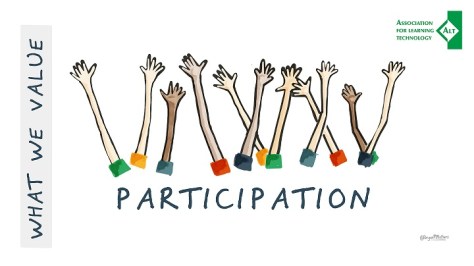
I think this line is really interesting from a recent discussion on the ALT Members mailing list.
…in particular to share these with academics when they ask for the evidence to show technology can make a difference.
Often when demonstrating the potential of TEL and learning technologies to academics, the issue of evidence of impact often arises.
You will have a conversation which focuses on the technology and then the academic or teacher asks for evidence of the impact of that technology.
From my experience when an academic asks for the evidence, then the problem is not the lack of evidence, but actually something else.
Yes there are academics who will respond positively when shown the “evidence”, however experience has taught me that even when that happens then there is then another reason/problem/lack of evidence that means that the academic will still not start to use technology to “make a difference”.
When an academic asks “for the evidence to show technology can make a difference” the problem is not the lack of evidence, but one of resistance to change, fear, culture, rhetoric and motivation.
You really need to solve those issues, rather than find the “evidence”, as even if you find the evidence, you will then get further responses such as, wouldn’t work with my students, not appropriate for my subject, it wouldn’t work here, it’s not quite the same, not transferable…. etc…
Despite years of “evidence” published in a range of journals, can studies from Jisc and others, you will find that what ever evidence you “provide” it won’t be good enough, to justify that academic to start embedding that technology into their practice.

As stated before, when someone asks for the “evidence” more often then not this is a stalling tactic so that they don’t have the invest the time, energy and resources into using that technology.
Sometimes it can be “fear” as they really don’t have the capabilities to use technology and lack the basic ICT confidence to actually use various learning technologies, and as a result rather then fess up their lack of skills, they ask for the “evidence”, again to delay things.
Just turn it around, when you ask those academics who do use technology then, you find that the “evidence” generally plays little or no part in their decisions to make effective use of technology.
So what solutions are there to solve this issue? Well we need to think about the actual problems.
A lot of people do like things to remain as they are, they like their patterns of work, they like to do what they’ve always done. This is sometimes called resistance to change, but I think it’s less resistance to change, and more sticking to what I know. I know what works, it works for me, and anything else would require effort. This strikes me more about culture, a culture where improvement, efficiency and effectiveness are seen as not important and the status quo is rarely challenged.
Unless an organisation is focused strategically and operationally in improvement, widening participation, becoming more efficient, then it is hard to get people to think about changing their practice.
When it comes to embedding learning technologies we often talking about changing the culture of an organisation. This can be hard, but doesn’t necessarily have to be slow. I am reminded of a conversation with Lawrie Phipps though in which he said we have to remember that academics often like the current culture, it’s why they work in that place and in that job. So don’t be surprised when you are met with resistance!
Creating a culture which reflects experimentation, builds curiosity and rewards innovation, isn’t easy, but also isn’t impossible. There are various ways in which this can be done, but one lesson I have learnt in making this happen, is that the process needs to be holstic and the whole organisation needs to embrace that need to change the culture. What I have found that you need to identify the key stakeholders in the organisation, the ones who actually have the power to make change happen. I found in one college I worked in that the real “power” wasn’t with the Senior Leadership Team (who often had the same frustrations I had when it came to change) but the Heads of Faculty, the managers who led and managed the curriculum leaders. They had the power to make things happen, but they didn’t always realise they held that power.
Getting the rhetoric right, but also understood across the organisation is critical for success in embedding learning technologies. Often messages are “broadcast” across an organisation, but staff don’t really understand what is meant by them and many staff don’t think it applies to them. Getting a shared understanding what is required from a key strategic objective is challenging. I have done this exercise a few times and it works quite well, pick a phrase from your strategic objectives and ask a room of staff or managers what it means and to write it down individually. You find that everyone usually had a different understanding of what it means. A couple of examples to try include buzz phrases such as “the digital university” and “embrace technology”.

Finally looking at what motivates people to use technology to improve teaching, learning and assessment.
When I was teaching, I would often experiment with technology to see if it made a difference, if it did, I adopted it, if it didn’t I stopped using it. The impact on the learners was minimal, as I didn’t continue to use technology that didn’t make a difference or was even having a negative impact. What I also did was I applied the same process and logic to all my teaching. So when I created games to demonstrate various economic processes, if they made a difference I used them again, if they didn’t then I would ask the learners how they would change or improve them. When I gave out a reading list of books, I would ask the learners for their feedback and, those that didn’t make a difference or had no positive impact, then they would be removed from the list! I was personally motivated, but we know you can’t just make that happen.
When I was managing a team I ensured that any experimentation or innovation was part of their annual objectives and created SMART actions that would ensure they would be “motivated” to do this. Again you need to identify the key stakeholders in the organisation, the ones who actually have the power to make this happen.
So when someone asks you to show them the evidence what do you do?
















